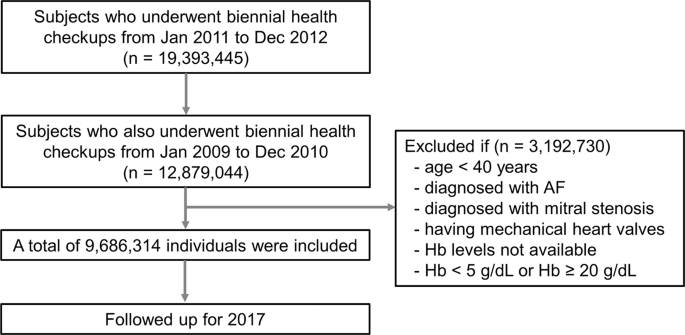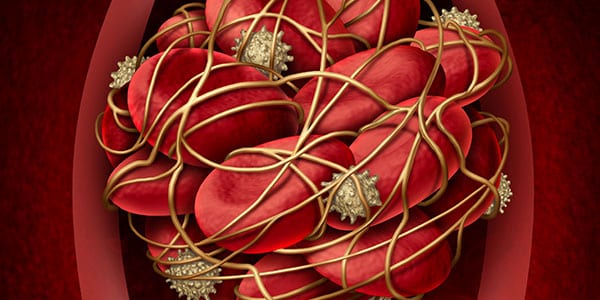Increased Hb Levels Are Associated with the Incidence of Atrial Fibrillation: But Is It Related to the Occurrence of Stroke
Anemia has been known to increase the incidence of atrial fibrillation (AF) in general practice. However, it is known that patients with polycythemia also increase the incidence of AF. Various mechanisms are known for this. It is thought that the inflammatory response of the vascular endothelial cell, the increase in viscosity, and the expansion of the left atrium due to an increase in atrial pressure cause AF.1-3) However, it is not easy to carry out a study on this through a large-scale heterogeneous group. Therefore, it can be said that analytical research through the population of the whole country has great significance. Hemoglobin (Hb) levels are generally known to be higher in men than in women. In addition, it is known that the incidence of AF is also higher in men than in women. However, the occurrence of AF was caused from a combination of several reasons including genetic and environmental factors.4)5) The most common causes are age, high blood pressure, and diabetes, and heart failure and coronary artery disease. In this issue of the Korean Circulation Journal, Kim et al,6) Figure 2 of this study shows how Hb levels influence the occurrence of AF. Similarly, the higher the body mass index (BMI), the higher the incidence of cardiovascular disease (CVD). And the U-shape pattern that the incidence of CVD increases even in patients with a relatively low BMI is also similarly applied in this study.7) There is a difference in cut off value for men and women,8) but this is thought to be due to a physiological difference depending on gender.
And it shows a U shape pattern in common. In the case of anemia, it varies according to the cause of the disease, but the more severe it is, the higher the incidence of CVDs including AF can be expected. However, it is interesting to note that in the case of polycythemia, the incidence of AF increases as the level of Hb increases. The mechanism of the disease has not been revealed, but it is generally thought that the increased viscosity of the blood, shear stress, hypoxia and inflammation, etc. affect the incidence of AF.2)3)7)9)10) Since this study was analyzed through retrospective claim data, there is a limitation in that it cannot take into account both the patient's drug prescription and the included confounding bias. Therefore, it seems that the basic animal and cell level experiments should be conducted along with prospective studies for each factor. And with the occurrence of AF, the part that we should be interested in is the occurrence of stroke. The reason why the occurrence of AF is important is the effect of subsequent strokes. It is well known that the incidence of ischemic events is high in patients with polycythemia,
Korean Circ J. 2020 Dec;50(12):1111-1112
KCJ Korean Circulation Journal 대한심장학회지 pISSN 1738-5520·eISSN 1738-5555 Editorial Received: Nov 17, 2020 Accepted: Nov 18, 2020 Correspondence to Junbeom Park, MD, PhD Department of Cardiology, College of Medicine, Ewha Womans University, 1071, Anyangcheon-ro, Yangcheon-gu, Seoul 07985, Korea. E-mail:
[email protected] Copyright © 2020. The Korean Society of Cardiology This is an Open Access article distributed under the terms of the Creative Commons Attribution Non-Commercial License (https:// creativecommons.org/licenses/by-nc/4.0) which permits unrestricted noncommercial use, distribution, and reproduction in any medium, provided the original work is properly cited. ORCID iDs Junbeom Park
ORCID Conflict of Interest The author has no financial conflicts of interest. The contents of the report are the author's own views and do not necessarily reflect the views of the Korean Circulation Journal. Junbeom Park , MD, PhD Department of Cardiology, College of Medicine, Ewha Womans University, Seoul, Korea Increased Hb Levels Are Associated with the Incidence of Atrial Fibrillation: But Is It Related to the Occurrence of Stroke? ► See the article “Sex-based Approach for the Clinical Impact of the Increased Hemoglobin on Incident AF in the General Population” in volume 50 on page 1095. and anti-platelets have been used to prevent this. However, if AF occurs in patients with Hb more than the cut off value shown in this study, it is not known whether the risk of stroke is increased compared to patients who do not. This is because all patients are already using anticoagulation or antiplatelet according to the CHA2DS2-VASc score. Therefore, it is believed that a more systematic study based on prospective data is necessary. This study is meaningful in predicting the risk of AF through Hb data that can be easily obtained in clinical practice. However, in patients taking anticoagulation, changes in Hb cannot have a significant meaning with only one test, and changes often occur according to the occurrence of events such as bleeding. Therefore, it is considered that a prospective study is also needed to determine how changes of Hb level according to sequential measurements affect the occurrence of AF and stroke
















